GetYourGuide has sent new proposed advertising modules to the European Commission as an alternative to Google Travel Ads, which the experiences platform argues doesn’t comply with the Digital Markets Act.
In essence, GetYourGuide wants to preclude Google from dominating the sector with its own vertical search service. GetYourGuide also wants to bar Google from jamming a variety of advertisers’ offerings into one Google Travel Ad, where GetYourGuide says the platforms have limited control over the content and how they compete.
The following is an exclusive look at GetYourGuide’s proposed Google advertising changes for the tours and activities sector, and we’ll show its mockups further below. However’s, first here’s some background on the issue.
The backdrop to the dispute is that when the Digital Markets Act went into effect last March, the European Commission opened a non-compliance probe into whether Google is giving greater preference to its own its own vertical search service in hotels, for example, over that of rival services. Similar dynamics may be in play for the experiences sector.
“The Digital Markets Act is clear that this must not be the default search experience,” Björn Borrmann, GetYourGuide’s director of policy, told Skift.
Google didn’t change its Travel Ads module when the Digital Markets Act went into effect, and GetYourGuide contends it doesn’t conform the law’s requirements.
Borrmann argues that Google is violating the competition act by grouping providers into a single ad unit and comparing prices and customer ratings, both of which make the Google Travel Ads a vertical search service. The DMA bars Google from giving priority to its own travel search service.
The Digital Market Acts, however, doesn’t specifically prohibit Google from grouping providers into a single advertising module.
“Finally, only Google decides which content to display in these units, and only Google can see what works and what doesn’t,” Borrmann said.
Asked to comment on GetYourGuide’s arguments, a Google spokesperson said: “The DMA does not prohibit helpful and innovative Search features and Ad formats, which help people find what they are looking for, and help businesses reach customers. Our proposed changes to Search results to comply with the DMA give all types of businesses equal opportunity to appear in units for things like hotels, flights or things to do.”
Google notes that some of those proposed changes have picked up support from airlines and hotels.
Google disputes GetYourGuide’s contention that providers have little control over Google Travel Ad content. “When it comes to specific ad formats like Travel Ads, we have long provided advertisers with granular controls to decide what to show, like images, prices and other attributes, and detailed reporting to understand how their ads perform,” the Google spokesperson said.
The commission is expected to detail its findings in the Google DMA noncompliance investigation in the next couple of months.
The Digital Markets Act was designed to level the competitive playing field by establishing limits on companies, including Google, Meta, Apple and Booking.com, that it designated as “gatekeepers” with outsized market share.
The following screenshot depicts how Google Travel Ads currently appear in the European Union for the query “things to do in Brussels.” This specific Google ad appeared in Germany on Monday.
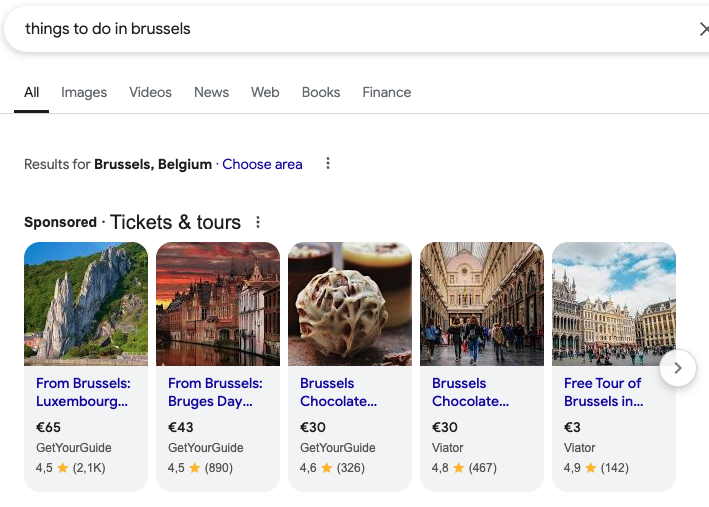
Source: Google
This Google Travel Ad unit appears at the top of the Google search page, higher than ads from rivals, and above any organic, or free, search results.
It is basically a Google metasearch service — think of something like Kayak, Trivago and Skyscanner — because it compares tours in and around Brussels from GetYourGuide and Viator based on price, review scores and images.
Importantly, according to GetYourGuide, Google takes a feed from GetYourGuide and Google’s algorithms — not the providers — chooses the photos, the product and content, and manages the ranking.
“Without the ability to control how their brands are represented, or learn from their ads’ performance, the only option for Google’s partners is to follow rough guidelines and spend more, hoping for the best,” Borrmann said.
GetYourGuide’s Proposed Ad Modules
GetYourGuide has shared the following four proposed ad format changes with the European Commission — and with Google. What they have in common is they display content from only one supplier or platform at a time, and Google gets displaced as the default tours and activities search engine.
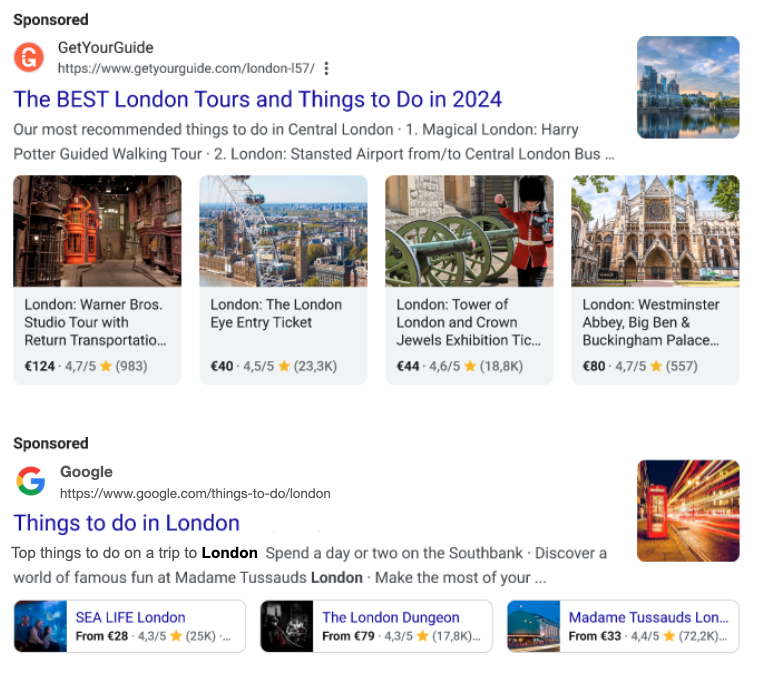
Source: GetYourGuide
In the screenshot above, the top portion is GetYourGuide’s sponsored ad that shows its own offerings for “things to do in London.” That’s distinct from appearing alongside other vendors in a Google Travel Ad that that’s displayed higher on the page or screen than rival ads. The bottom portion of the screenshot above shows a theoretical Google ad for things to do in London in the unlikely event that Google was to become an online travel agency. The idea is that Google in such a scenario would be able to compete in a transparent auction as would any other company instead of automatically appearing higher than competitors’ ads in Google search.
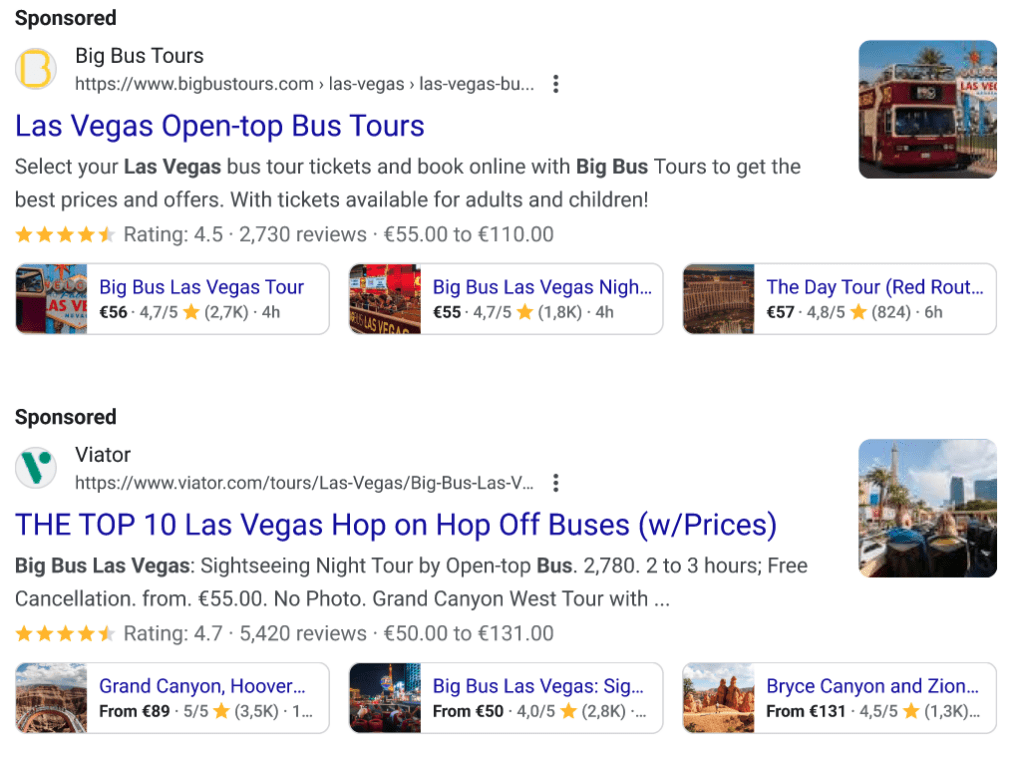
Source: GetYourGuide
The GetYourGuide proposed ad format above shows ads from Big Bus Tours and Viator for bus tours in Las Vegas. Again, they show just one vendor per ad, giving the advertisers more real estate and leeway to compete than they would get in a vendor mashup in a Google Travel Ad.
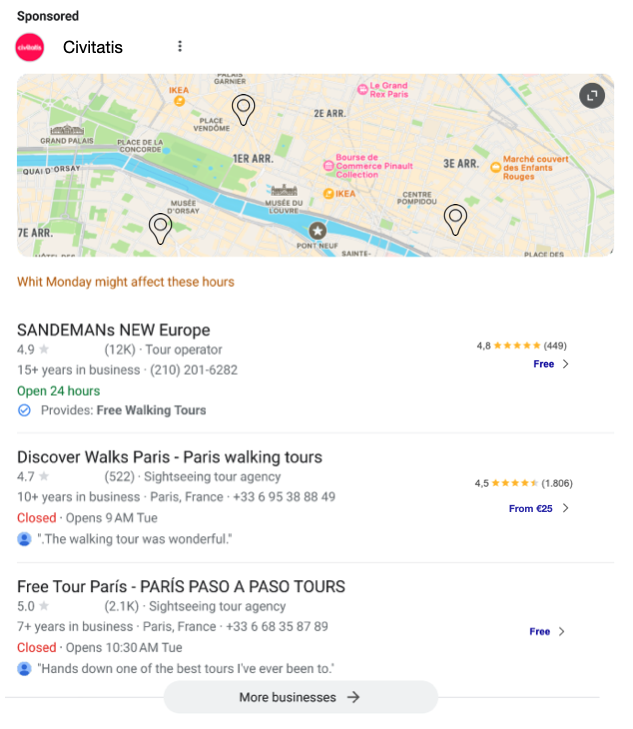
Source: GetYourGuide
The screenshot above shows how eliminating Google Maps as the default map on Google could open up competition in the maps arena. The ad shows how online online travel agency Civitatis could publish its own map on Google, and fill it in with various walking tours in Paris. Thus maps could be competitive modules subject to auctions that could generate revenue for Google, GetYourGuide argues.
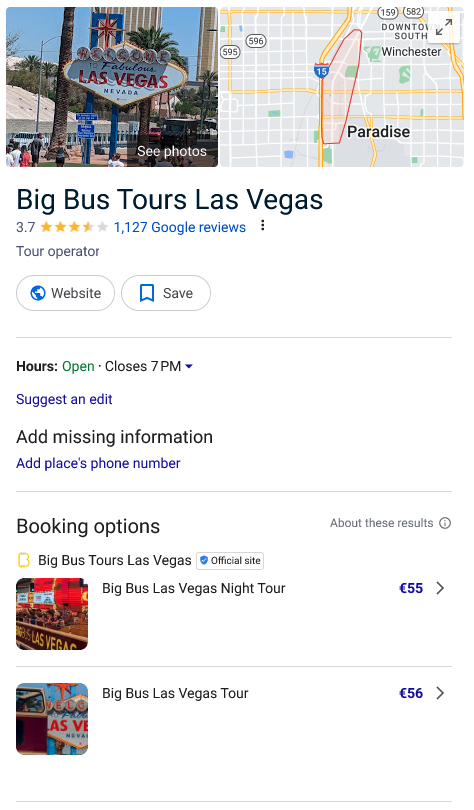
Source: GetYourGuide
The screenshot above shows a Big Bus Tours Las Vegas booking module. You click on the ad to navigate to the advertiser’s site to book the tickets. The key difference between this proposed ad format versus Google’s is that the GetYourGuide-proposed booking module shows just one advertiser offering a variety of tours. The Google booking module typically shows multiple vendors each displaying one product, and there’s little competition other than over price.
“Experiences are not commodities like flights,” said Emil Martinsek, GetYourGuide’s chief marketing officer. “Customers want to compare different activities with different features at different price points to find the best experience and value for them.”
GetYourGuide said since April 2023 it has seen increased clicks from Google Travel Ads as some other advertising products were mothballed. Martinsek said despite the increased clicks, Google’s Travel Ads have shown lower conversion and repeat rates than with Search Ads. “In short, from our data, it appears they [customers] are struggling with the ad format. And it is difficult for advertisers — operators and platforms — to help, given how little control we have over our content.”

